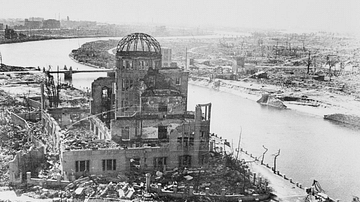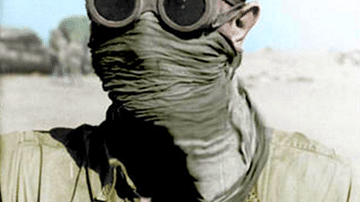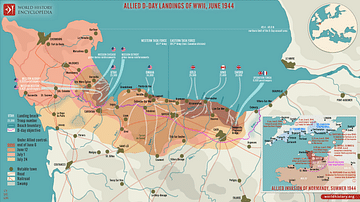Search
Did you mean: Veii?
Remove Ads
Advertisement
Summary 
Loading AI-generated summary based on World History Encyclopedia articles ...
Search Results

Article
The Red Army in WWII
The Red Army of the USSR began the Second World War (1939-45) with a series of shocking defeats, but from late 1942, it rallied and held on to key cities like the capital Moscow, Leningrad (Saint Petersburg), and Stalingrad (Volgograd). Then...

Article
The Causes of WWII
The origins of the Second World War (1939-45) may be traced back to the harsh peace settlement of the First World War (1914-18) and the economic crisis of the 1930s, while more immediate causes were the aggressive invasions of their neighbours...

Article
What Were the Consequences of WWII?
The consequences of the Second World War (1939-45) were many and varied. Nazi Germany, Fascist Italy, and military-dominated Japan were all defeated. Many occupied countries were liberated and regained their freedom while others were obliged...

Article
Daily Life in the WWII Desert Campaigns
The desert campaigns in North Africa during the Second World War (1939-45) provided soldiers on all sides with a set of particular challenges. Scorching day temperatures, freezing night temperatures, sand and flies getting everywhere, the...

Image Gallery
50 Stunning Photographs of WWII
This gallery of photographs tells the dramatic story of the Second World War (1939-45). The selection aims to reflect the global nature of the conflict and reveal many of its different aspects, from major battles to the daily life of soldiers...

Image
WWII North Africa Campaign, 1940-1943
This map illustrates the North Africa Campaign of World War II, spanning from 1940 to 1943 - a series of operations and battles for control of the strategic region between the Allied forces (primarily the British Commonwealth) and the Axis...

Image
Europe on the Eve of WWII, 1939
A map illustrating the growing instability in Europe in the lead-up to World War II, capturing the aggressive territorial expansion of Nazi Germany and the failure of appeasement. Between 1935 and 1939, a series of bold geopolitical moves...

Image
Allied D-Day Landings of WWII, June 1944
The Allied D-Day landings (D-Day is a military term used to designate the day on which a combat operation is scheduled to begin), which took place on June 6, 1944, marked the largest seaborne invasion in history and a pivotal moment in the...

Image
The Dowding System of WWII - How Radar, Intelligence, and Coordination Foiled the Luftwaffe and Won the Battle of Britain
This infographic illustrates the Dowding System, Britain’s groundbreaking air defense network that played a critical role in winning the Battle of Britain during World War II. Designed by Air Chief Marshal Hugh Dowding (1882–1970), it was...

Image
Make-do & Mend Poster, WWII
A British Board of Trade poster encouraging people to make-do and mend old clothes rather than buy new ones, thus saving on resources. Clothes were one of many restricted items during rationing in wartime Britain. (Imperial War Museums)